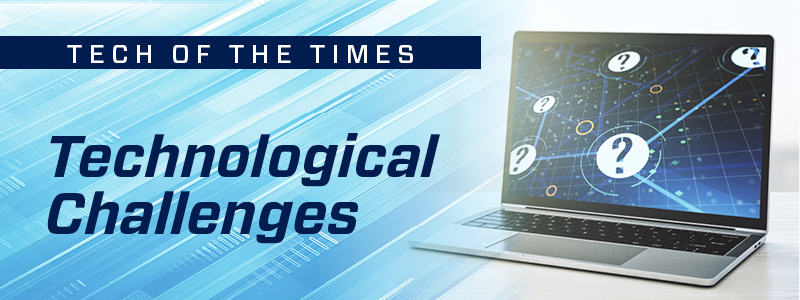
There is a great video, “Medieval Helpdesk,” in which a lawyer (okay, a monk) seeks assistance with a new form of technology: a book. (FYI: the video is subtitled.) Watching it makes us chuckle and squirm at the same time because we see ourselves in the monk’s anxiety over a relatively simple device.
Lawyers have been wringing their hands for more than a decade over the extent to which they must become “technologically competent.” The ABA deemed the issue worthy of inserting eight words to the last comment to Rule 1.1 on competency, stating that the responsibility to keep up to date on the law and practice includes “the benefits and risks associated with relevant technology.” If you think that provides precious little guidance on what lawyers need to learn about tech, you are not alone.
Nevertheless, there seems to be tacit agreement that lawyers are reluctant to give up their scrolls. One imagines that the roots of these Luddite tendencies go back at least to the widespread appearance in offices of the typewriter in the 1880s.[1] A marvelous device—but typing quickly became thought of as a menial skill or a skill that “professionals” should not be tasked with, even though an assistant who could type 100 words per minute was worth her weight in gold.[2]
People master technology when it is important to them or it saves them money.
People master technology when it is important to them or it saves them money. Typewriters did not interfere with lawyers’ practice of dictating to assistants trained in stenography (also a skill, just not one that lawyers cared to learn), who would then type the lawyer’s words. Some lawyers later progressed to dictating on reel-to-reel tapes, then on cassettes, then on microcassettes. There are only about three buttons on a Dictaphone, well within a lawyer’s sphere of technological mastery.
As computers became commonplace, a generational divide developed. The initial presumption, manifested in my first three office jobs after college, was that only secretaries needed computers, which were essentially glorified typewriters. It was not until the early ‘90s that computers began appearing on lawyers’ desks. Software was still a mystery to lawyers. Staff who did not have billable hours goals could afford to take the time for day-long seminars on how to use WordPerfect or its competitor, Word, which despite the truncated name was not easier to use. [3]
Email, although not the original “killer app,”[4] presented a quantum technological leap for lawyers. When you think about it, there’s little to learn about composing and sending e-mail. There is almost no formatting, only a few key buttons (New, Send, Reply, Delete) and the rest is just hunting and pecking. Lawyers could use computers to communicate in writing, bypassing staff.
Overall, however, lawyers have demonstrated themselves reluctant to abandon their reliance on staff. When administrative tasks are assigned to a nonlawyer assistant, that person learns the software, leaving the lawyer unable to independently assemble multiple documents into a single PDF, e-file documents with the court, or use e-discovery tools. Although one does not need to be able to type to understand the workings of a typewriter, not understanding how to use the redaction tool in Adobe Acrobat can lead to the inadvertent disclosure of confidential information in court filings, not to mention the accompanying opprobrium.[5]
So we arrive at the question: what does a lawyer need to learn to be technologically competent? Here are some places to get started.
Software savvy. Learning to use common, everyday software tops the list, especially where it could negatively impact your practice or other ethical responsibilities. A quick Google search yields short, efficient videos on proper redaction in Acrobat and how to use tracked-changes in Word. In fact, the answer to nearly all your questions about how to use software is only a quick (free) search away. If you practice family or business law, you probably need to know how to use a spreadsheet so that you do not inadvertently replace a formula with a number and change an entire series of entries. You can Google that as well.
Finding files and folders. During the pandemic, I am sure many lawyers have gone paperless only to discover how difficult it can be to locate electronic documents on their computers. At a minimum, technological competence includes having a file-naming system that allows lawyers to find documents they have scanned or received electronically. After all, you cannot send your client their file if you cannot find it. Pro tip: always insert dates year first, e.g. 2022.09.24, and include a client identifier (name, initials, or number) in every file name.
E-mail education. In the mid-2010s, we were amused by solicitations from the Prince of A-Country-You’ve-Never-Heard-Of for assistance in recovering huge sums of money. Now, ransomware has become so sophisticated that the fraudsters actually have call centers to handle inquiries from people whose data has been locked up or stolen from them. The prevalence of e-mail phishing schemes implicates your duty to protect confidential information and to disclose data breaches to your clients and threatens your ability to operate your law practice. A good place to start is this Google phishing quiz. From there, you can read a wealth of articles to educate yourself about how to recognize various e-mail scams.
Ubiquitous updates. You may think you are a hero for keeping your car until it is 15 years old and has 150,000 miles on it. (I know I am.) You are not a hero if you are operating a computer on Windows 7 and you haven’t upgraded your email service in 10 years. Software companies eventually cease updating older versions of operating systems, leaving you vulnerable to security breaches. The video graphics card in your old computer will not keep up with the streaming requirements of a post-pandemic law practice. Upgraded email service may help you identify and delete spam.
Zoom zeitgeist. You need to know how to keep your face in the middle of the screen during a video call and how to look at the camera. And not show up as a cat. (He was a very good sport about it, by the way, another lesson for all of us.)
This may seem like a daunting list for the technologically impaired. But everything on it can be self-taught and implemented. If you want a tutor, keep in mind that there is no longer any limit on the number of law office management courses you can take to satisfy your reporting requirements. Remember as well that a book is not really much different from a scroll, if you approach it in the right way.
 By Eric T. Cooperstein
By Eric T. Cooperstein
etic@ethicsmaven.com
Eric T. Cooperstein, the “Ethics Maven,” defends lawyers and judges against ethics complaints, provides lawyers with advice and expert opinions, and represents lawyers in fee disputes and law firm break-ups.
[2] “According to the 1900 census, 94.9% of stenographers and typists were unmarried women.” Id.
[3] Sorry WordPerfect devotees, I am not in your camp. Despite WordPerfect’s many advantages over Word, WordPerfect lost the battle. It’s been over 20 years. You need to use Word.